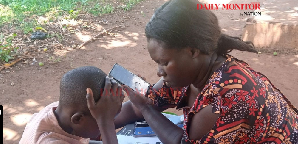 A Primary Four pupil struggles to read four-letter words during a learning assessment
A Primary Four pupil struggles to read four-letter words during a learning assessment
Many primary pupils in mostly rural public schools in northern Uganda are unable to read or recognize basic words, an education assessment has found, raising alarm over the country’s foundational learning crisis.
At Alem Primary School in Kole District, many Primary Four (P4) learners could not identify simple letters such as U, T, I, N, or read four-letter words like “hunt,” “nest,” and “road” – except for one: “food”.
The findings came during a recent learning outcomes and gender-inclusiveness assessment conducted in 32 schools across Kole, Oyam, Arua, and Alebtong districts by FICH-Uwezo Uganda from April 10 to 13.
“Some learners kept counting fingers and toes, but still got the answers wrong,” one assessor said, after observing Primary Three pupils fail basic arithmetic like 13+25 and 4×7.
Mr Moses Okello, Executive Director of Growth Care-Uganda, said the crisis goes beyond literacy.
Overcrowded classrooms, with some teachers handling up to 300 learners, are undermining any chance at quality education, he noted.
“These teachers are overstretched. Parents, too, are not doing enough to support their children’s learning,” Okello told Daily Monitor on Tuesday.
At Ocini Primary School in Oyam District, Dr Sara Ruto of Echidna Giving, a US-based philanthropic organisation, observed how local teachers struggle to deliver lessons.
“Some children grasped the math concept. Others didn’t. But what gave me hope is that the teacher knew how to simplify the lesson,” she said after watching a Primary Three class on place values.
Still, Dr Ruto acknowledged the systemic challenges: “Public school systems across East Africa face similar problems. Either the curriculum is overambitious, or we’re failing learners too early.”
She argued that early literacy and numeracy are matters of social justice.
“If a child cannot read or do math, they’re shut out of opportunity. Ensuring every child learns is not charity – it’s their right,” she added.
Ms Molly Grace Akello, deputy head teacher at Ocini, said hunger is a major obstacle.
“Pupils leave home at 6am and return at 5pm without a meal. By 2pm, they’re dozing,” she said.
Some parents, however, resist the idea of contributing food for school meals.
“When we called a meeting, they said, ‘We studied without food. Why are you forcing us to bring food?’ Ms Akello recalled.
Echidna Giving, through its partnership with the Foundation for Inclusive Community Help (FICH), is supporting a three-year initiative to improve foundational literacy and numeracy for 24,000 learners across the four districts.
FICH executive director Mr Emmy Zoomlamai Okello said the project also trains teachers to deliver lessons at the right level, helping children “learn with fun.”
Government’s plan
The Ministry of Education and Sports announced a national lunch programme in 2024, expected to roll out in the 2026/2027 financial year. Education Minister Janet Museveni described the plan as “central to improving learning outcomes” under the NRM’s 2021–2026 manifesto.
For now, however, the growing gap between enrollment and attendance paints a grim picture for children in northern Uganda.
